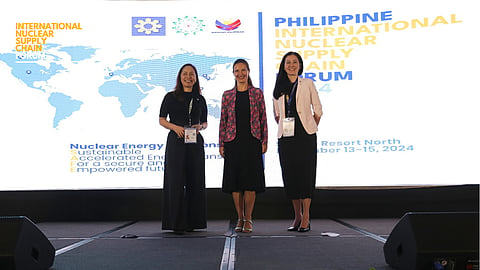
- NEWS
- the EDIT
- COMMENTARY
- BUSINESS
- LIFE
- SHOW
- ACTION
- GLOBAL GOALS
- SNAPS
- DYARYO TIRADA
- MORE

Canada and France offer insightful perspectives on their extensive experience in the nuclear energy industry.
At the recent Philippine International Nuclear Supply Chain Forum, the two nations demonstrated the most recent developments in nuclear technology, emphasizing breakthroughs that have put them at the forefront of the sector worldwide.
Canada, a leader in nuclear energy worldwide thanks to its creative reactor designs, strict safety regulations, and “on-time and on-budget” project execution plan, has stated its support for the Philippines’ objective of creating a more resilient, sustainable, and clean energy future.
Canadian Ambassador to the Philippines David Hartman highlighted Canada’s entire nuclear ecosystem, which includes funding options through Export Development Canada and cutting-edge reactor technologies.
According to Hartman, Canada is ready to provide the Philippines with a full range of resources and experience to assist guarantee its success on its nuclear energy journey.
According to the Philippine Energy Plan’s Clean Energy Scenario, 1,200 MW of nuclear energy capacity would be installed by 2032, with plans to double that amount to 2,400 MW by 2035 and then increase it to 4,800 MW by 2050.
This phased expansion of nuclear power is in line with the Philippines’ long-term objectives for economic growth, energy security, and climate change mitigation.
With 19 reactors producing roughly 15 percent of the nation’s electricity, Canada’s nuclear energy industry is essential to its clean energy agenda.
Canada has developed extensive expertise across every phase of the nuclear fuel cycle, from uranium mining to reactor operation and eventual decommissioning.
Its CANDU reactor technology, known for its safety and efficiency, uses natural uranium and heavy water and is deployed in several countries worldwide.
Additionally, Canada is home to the world’s fourth-largest uranium reserves, with Saskatchewan’s high-grade deposits accounting for over 8 percent of global uranium production, making the country the second-largest producer globally.
Meanwhile, French Ambassador to the Philippines Marie Fontanel said that French Ministry of Ecological Transition, Energy, Climate and Risk Education and the Philippine Department of Energy are currently in discussion to sign a Memorandum of Understanding on cooperation in energy transition and the implementation of nuclear programs.
This will focus on training, research and capacity building, including technical assistance on energy transition with focus on nuclear energy.
